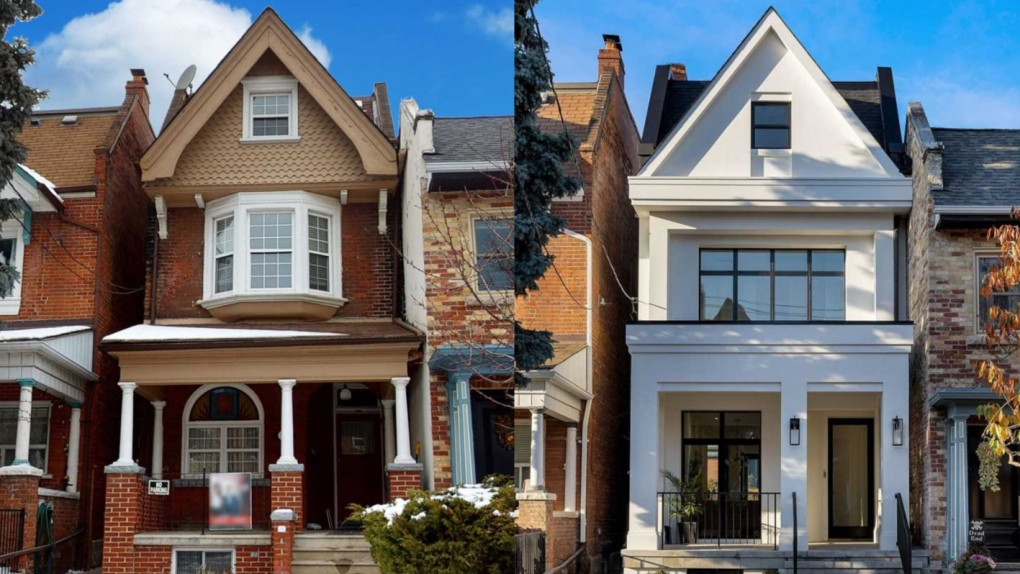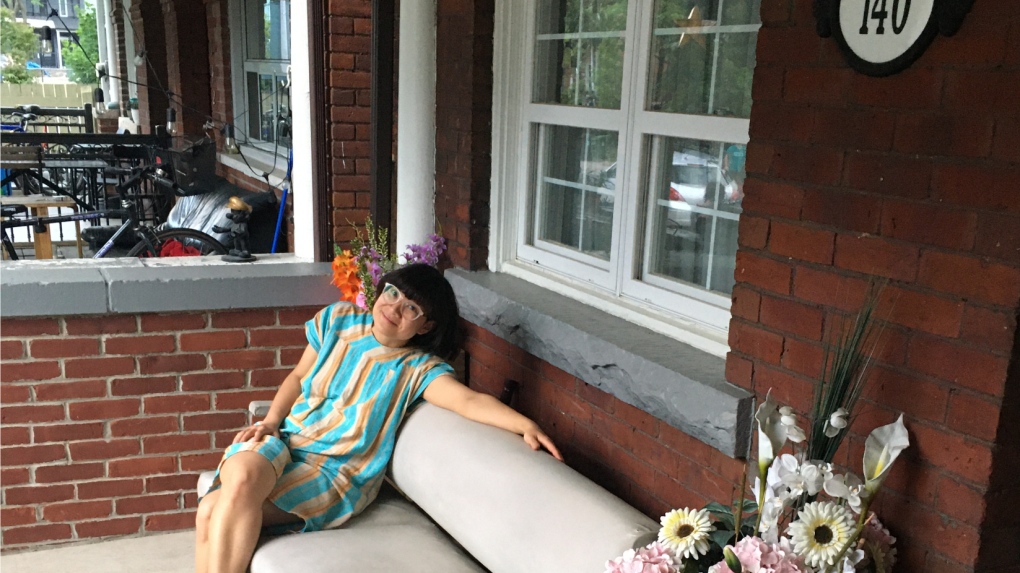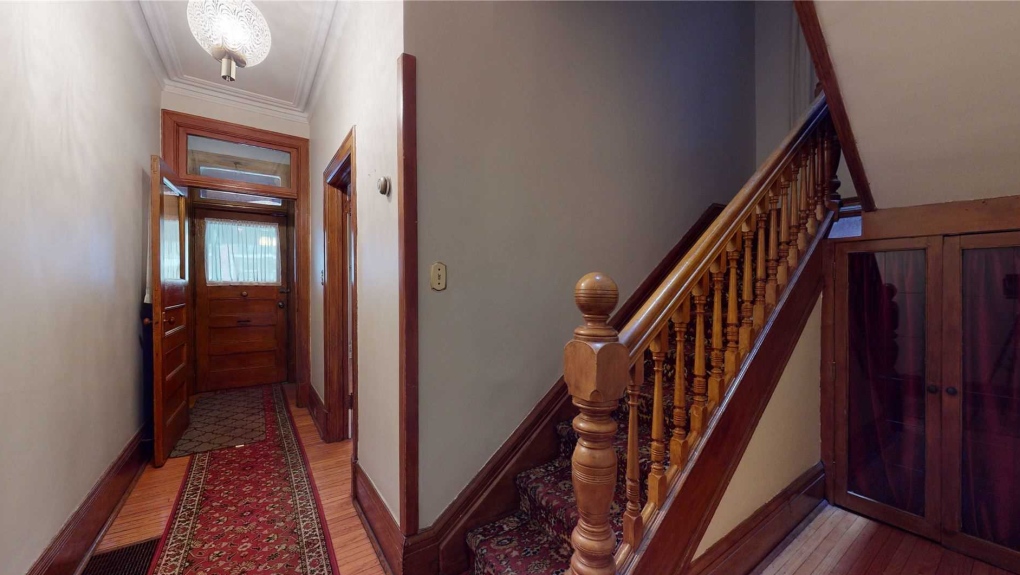$3.85M 'opulent McMansion' sits on the market in Toronto as longtime tenants displaced
 A house in Toronto’s Trinity Bellwoods neighbourhood is seen before and after renovations (Realtors.ca).
A house in Toronto’s Trinity Bellwoods neighbourhood is seen before and after renovations (Realtors.ca).
In the decade Maria Bui lived in her downtown Toronto apartment, her rent rose a total of $70.
For 12 years, Bui lived at 140 Harrison St. in the city’s Trinity Bellwoods neighbourhood. Then, in 2020, her longtime tenancy came to an end – the house of four-units would soon be converted into an opulent single-family home and placed on the market for $3.85 million.
 Maria Bui is photographed at her former home of 12 years at 140 Harrison St in Toronto.
“The renters on the street just all started disappearing, the class level started changing, they were no longer young artists and musicians,” Bui told CTV News Toronto. “Business professionals were moving into the neighbourhood.”
Maria Bui is photographed at her former home of 12 years at 140 Harrison St in Toronto.
“The renters on the street just all started disappearing, the class level started changing, they were no longer young artists and musicians,” Bui told CTV News Toronto. “Business professionals were moving into the neighbourhood.”
At its highest, Bui’s monthly rent came to $870 – almost $2,000 less than the current average in Toronto.
“By the time we left two years ago, we were just like, ‘We’re done with the neighbourhood. We can’t afford it, they don’t want us here, we’re out,’” Bui said.
“That whole sense of community has really shifted and disappeared.”
The house’s transformation – from a multi-unit with below market rent to a luxury single-family home – is not an anomaly in Toronto. But rather, housing and legal experts say that what happened at 140 Harrison is emblematic of why a housing crisis continues to grip the city.
‘I CALLED IT HOME’
For close to a decade, three tenants and an elderly landlord lived under a shared roof at 140 Harrison, a couple blocks northwest of Trinity Bellwoods Park.
In early 2021, the landlord placed the house on the market. It sold in two days for $1.75 million. The new owners then gave the house a facelift, nearly doubling its value, and re-listed it. At first, they listed the property for $3.85 million, but recently lowered it to $3.8 million. It still sits unsold.
In November 2022, Toronto Life published a House of the Week article about 140 Harrison, which stated: “The owners intended to renovate and move into the home. However, they’ve since changed their minds and are looking for a buyer with a taste for luxury.”
The current owners of the house rejected interview requests from CTV News Toronto and responded through legal representation. “The Clients do not wish to make any statements or comments about the subject property,” lawyer Anna Vinberg said in an email.
What was once a home basking with old school charm dating back to the 1800s, inhabited by tenured tenants, is now fully renovated for a “modern family,” built to “suit demanding taste and lifestyle,” according to its listing.
 Glass-walled stairs and a kitchen-area is seen at 140 Harrison St. after renovations (Realtors.ca). A glass-walled staircase stands in the place of what were once wooden stairs adorned with an ascending red runner. Arched stained glass windows became rectangular black bordered panels, and white kitchen tiles were turned into smooth hardwood floors.
Glass-walled stairs and a kitchen-area is seen at 140 Harrison St. after renovations (Realtors.ca). A glass-walled staircase stands in the place of what were once wooden stairs adorned with an ascending red runner. Arched stained glass windows became rectangular black bordered panels, and white kitchen tiles were turned into smooth hardwood floors.
KT, to whom CTV News Toronto has granted anonymity, lived in the apartment for 12 years. From the start, she said she locked in affordable rent, just like Bui.
From her one bedroom unit in the attic she could see the CN Tower. The window with a view is still there, but now, her bedroom is a giant bathroom equipped with a soaker tub and heated floors.
“The place was small but I called it my home,” KT said.
After packing up her art studio in the kitchen and plants beneath her skylight window, KT said she was unhoused for months before finding a new affordable unit.
‘OPULENT McMANSION’
It took 10 months for the basement tenant in 140 Harrison to find a new place to live, and when she did, her rent almost doubled, consuming her entire Ontario Disability Support Program (ODSP) monthly allowance. “I was rejected as a tenant 10 times over that span of time. It was my first time applying for apartments as an ODSP recipient,” she said.
CTV News Toronto has also agreed to protect her identity.
At Harrison, her rent started at $700 in 2014. It never rose higher than $740 a month. After months of searching for a new place to live, her life began to unravel.
 Wooden stairs as seen in 140 Harrison St. before renovations took place (Realtors.ca). “When my housing crisis started I had a part-time job, which I had held for eight years. Nine months into my eviction, I quit that job because fighting to stay housed, being harassed, looking for a place to live and being rejected, had completely and utterly devastated me,” she said.
Wooden stairs as seen in 140 Harrison St. before renovations took place (Realtors.ca). “When my housing crisis started I had a part-time job, which I had held for eight years. Nine months into my eviction, I quit that job because fighting to stay housed, being harassed, looking for a place to live and being rejected, had completely and utterly devastated me,” she said.
“I could no longer think clearly enough to do my job. I was suicidal. I discussed assisted suicide with friends and family.”
Shortly after she left, the entire house was gutted and flipped, according to Samuel Mason, a lawyer with Parkdale Community Legal Services, which represented the basement tenant.
“Now it’s this opulent McMansion in downtown Toronto selling for over $3 million. It’s a real micro example of how forceful capital is displacing tenants in Toronto. This was a four-unit home, affordable rent for tenants in downtown Toronto, my client was on social assistance, happy, content, all was well,” Mason said.
 A renovated bathroom is seen at 140 Harrison St (Realtors.ca).What happened at 140 Harrison is not a rarity, he said. “It happens all over the city, all the time.”
A renovated bathroom is seen at 140 Harrison St (Realtors.ca).What happened at 140 Harrison is not a rarity, he said. “It happens all over the city, all the time.”
‘THE CITY’S JOB’
The transformation of 140 Harrison is textbook gentrification, according to Murtaza Haider, a professor of real estate management and data science at Toronto Metropolitan University.
“The question is: ‘What does it do to housing affordability?’” Haider said.
“When gentrification takes place, it pushes the low to middle income earners out of the neighbourhood to further, peripheral areas.”
While the evictions and renovations were at the hands of the landlord, Haider said it's not their responsibility to “fix” the housing crisis and provide affordable rental stock – it’s the job of the city and the province.
CTV News Toronto asked the City of Toronto if they would consider implementing a policy preventing the conversion of multi-unit homes into single-family houses. Despite repeated requests over the span of weeks, they did not provide a response.
In December, Ontario Premier Doug Ford granted Toronto Mayor John Tory “strong mayor” powers in an effort to fast track housing development. While the city says it is aiming to build 40,000 new affordable rental homes by 2030, Haider says it’s not enough. The city already needs tens of thousands of new affordable units, he added.
“The way to fix it is to facilitate the construction of more purpose-built rental houses … [but] the incentive to build and to hold these properties as rentals is not there,” Haider said.
“It’s the state’s responsibility to change the fundamentals of construction in favour of purpose-built rentals so that such arbitrary decisions about renovations and evictions should not happen.”
After leaving 140 Harrison, Bui moved into her partner’s place across the street. She watched from her window as her red brick home of 12 years was gutted and painted beige.
“It sticks out like a sore thumb,” she said.
CTVNews.ca Top Stories

W5 Investigates A 'ticking time bomb': Inside Syria's toughest prison holding accused high-ranking ISIS members
In the last of a three-part investigation, W5's Avery Haines was given rare access to a Syrian prison, where thousands of accused high-ranking ISIS members are being held.
'Mayday!': New details emerge after Boeing plane makes emergency landing at Mirabel airport
New details suggest that there were communication issues between the pilots of a charter flight and the control tower at Montreal's Mirabel airport when a Boeing 737 made an emergency landing on Wednesday.
BREAKING Supreme Court affirms constitutionality of B.C. law on opioid health costs recovery
Canada's top court has affirmed the constitutionality of a law that would allow British Columbia to pursue a class-action lawsuit against opioid providers on behalf of other provinces, the territories and the federal government.
Cucumbers sold in Ontario, other provinces recalled over possible salmonella contamination
A U.S. company is recalling cucumbers sold in Ontario and other Canadian provinces due to possible salmonella contamination.
Irregular sleep patterns may raise risk of heart attack and stroke, study suggests
Sleeping and waking up at different times is associated with an increased risk of heart attack and stroke, even for people who get the recommended amount of sleep, according to new research.
Real GDP per capita declines for 6th consecutive quarter, household savings rise
Statistics Canada says the economy grew at an annualized pace of one per cent during the third quarter, in line with economists' expectations.
Nick Cannon says he's seeking help for narcissistic personality disorder
Nick Cannon has spoken out about his recent diagnosis of narcissistic personality disorder, saying 'I need help.'
California man who went missing for 25 years found after sister sees his picture in the news
It’s a Thanksgiving miracle for one California family after a man who went missing in 1999 was found 25 years later when his sister saw a photo of him in an online article, authorities said.
As Australia bans social media for children, Quebec is paying close attention
As Australia moves to ban social media for children under 16, Quebec is debating whether to follow suit.

































